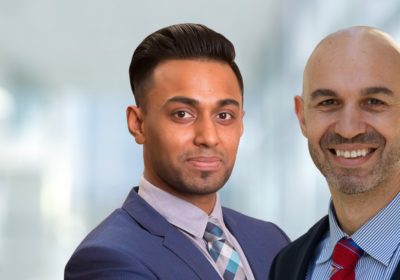
- Author: Jessica Mudditt
- Posted: June 20, 2023
CFO, Marcus Marano > World Class Leadership gleaned from a Global Career
Marcus Marano’s commercial acumen and deep expertise in data analytics has seen him lead transformational projects in financial services across the globe, including five years as A/NZ CFO of American Express.
Marcus Marano began his career in financial services in 2004 with multinational Citigroup, and there was arguably no better introduction to the importance of data analytics for supporting business growth.
“Citi led the way in using data-driven decisions to enable better investment and customer strategies in financial services and banking,” says Marano. “I would say there are still some organisations today that aren’t quite where Citi was 20 years ago.”
Marano’s role blended financial analysis and modelling with customer portfolio analytics. He used data to inform decisions that would deliver the best shareholder returns and customer value in retail banking.
Citi’s business in Japan was growing rapidly and in 2008, Marano relocated from Sydney to Tokyo with his wife, Vanessa. Marano was involved in a deal with an airline that would offer its customers benefits on Citi credit cards.
“It was a great first experience of going to a new market,” he says. “It was an eclectic C-suite – there were people from India, the United States and another Australian, plus a substantial Japanese representation.”
Although Citi is an American multinational with a global outlook and business culture, Marano nonetheless needed to navigate a different approach to decision-making in Japan. There is typically a stronger hierarchical dimension to doing business, and less autonomy invested in a variety of roles below the executive team.
Marano has since worked all around the world and has learned valuable lessons about cross-cultural communication and the key business skill of adaptability.
“Don’t go into a new cultural market and try to change it,” he says. “Accept it and work with it. The aim should be to provide your value by complementing what is already there, rather than trying to overrun it.”
For those open to it, international assignments provide an invaluable opportunity for self-development.
“It’s important to understand that you’re there to develop yourself as well as to further the business goals,” he says. “Be self-aware and accept feedback. To be honest, this part took me a little while to learn.”
From Tokyo to Brussels and beyond
The deal with the airline was completed within nine months and Marano and his wife returned to Sydney – although not for long. Marano hungered for another international assignment. He is half-Italian and Vanessa is half-British, so Europe seemed like the natural choice.
Happily, Marano was handpicked for a role in Brussels as the director and country head of Decision Support. He reported directly to the Belgium CEO and was tasked with building a new decision support function that was similar to what he had built in Australia. Time was short, as there was the possibility that the business would be sold.
“The most challenging aspect of my role was to change the identity of finance…Outside of the CEO, I think that this idea was quite confronting for the leadership team. I took the time to understand their motivations and worked out how I could help them achieve their goals. I needed to demonstrate that I was an enabler rather than a roadblock.”
Marcus Marano, Former CFO, AMEX A/NZ
Marano scoured Citi’s top talent from across its global operations and recruited 40 people to work on resetting the business growth trajectory for the potential sale. Technical expertise was of course incredibly important, but Marano was also looking for certain attributes, such as a hunger to solve problems.
“I like to bring in people who have the confidence to have an opinion. I wasn’t looking for people who would mirror my views. I wanted to hear different perspectives that would challenge the status quo,” he says.
“I’m not saying that we needed that for every role, but it was a big aspect in what I was looking for in the talent that came through for the transformation.”
Marano was working in a trilingual environment of Flemmish, French and English. He had a French tutor and he was mindful about the way he communicated in English.
“I learned a lot about how to communicate with both clarity and conviction,” he says. “I was often talking about change and trying to demonstrate why we were doing certain things – getting it right took time and patience.”
Citi sold the Belgium business to Société Générale, which is the third largest bank in in France.
Sky high in London
Next came a role as the head of finance in analytics and modelling at the Royal Bank of Scotland. For family reasons, Marano relocated to London after a year. He also left banking for the first time to work for Sky Media and Broadcaster. As Head of Trading, Marano was leading its acquisition and retention strategies. His goal was to make sure that the subscription-based business was bringing in high-value customers and build portfolio management strategies to engage customers and reduce attrition within a competitive market.
“We were an internal consultancy using decision science and analytics to advise the business about how best to invest – both by acquiring new customers and retaining the high value customers over time,” he says.
“It was a fast-paced, high velocity environment, with a lot of decisions made on the fly. It was very different to financial services.”
In 2014, Marano returned to Citi and became regional director. He was based in London and led decision support for the EMEA Retail Bank business across eight markets in the Middle East, Africa and Europe. Over the next couple of years, Marano built a new retail banking business model and built Centres of Excellence in places such as Poland and India. The role gave him invaluable exposure to non-traditional markets.
In 2015 he and Vanessa moved to Chicago to become director of US Retail Services and worked with top retailers like Macy’s, Bloomingdales and The Home Depot on retail growth and portfolio margin strategies.
Marano has consistently sought out roles that involve solving a problem through a digital transformation.
“I love to go into an environment where I can drive change,” he says. “I’m customer-obsessed and love to solve a problem by working with the executive team. Over the years, I’ve moved around quite a bit to find those kinds of opportunities.”
Gaining trust and a seat at the table
Marano’s biggest role yet came when he and his young family returned to Sydney in 2018 and he became the CFO of American Express in Australia and New Zealand. The footprint of the American multinational financial services corporation had been shrinking as a result of regulatory changes and other challenges. Marano was tasked with working with the new CEO to develop a five-year reset strategy that would boost profitability.
“The key priority was ensuring that the business was structured in a way that could deliver returns not just to shareholders, but also providing value for customers, colleagues and also the community,” he says.
Marano was also a member of the board, which gave him a holistic view of the business and its broader strategy.
Success in his role depended on building relationships with a variety of stakeholders and persuading them that finance needed a seat at the table in commercial dialogue. This was not something that could be achieved overnight.
“The most challenging aspect of my role was to change the identity of finance,” he says.
“Outside of the CEO, I think that this idea was quite confronting for the leadership team. I took the time to understand their motivations and worked out how I could help them achieve their goals. I needed to demonstrate that I was an enabler rather than a roadblock.”
Marano knew it was essential to establish his value from the get-go. Rather than going in with a checklist of questions about why certain decisions had been made, Marano presented possible solutions that had been developed through data analytics.
“This enabled me to have less of a transactional discussion and more of an open and strategic conversation,” he says.
He also set aside time to have less transactional conversations, which were necessary in order to build a rapport.
“When you start to speak the same language, you become a trusted subject matter expert. It is not easy. It took us a couple of years to get there. But once we were embedded, there was a lot of trust.”
Marano and his team gained representation on business committees that finance would ordinarily not participate in and contributed to the formulation of product and business strategies.
After five years in the role of CFO, Marano exited American Express a few months ago. He is currently reconnecting with his network, both locally and globally, to assess the markets and see where the next venture challenge resides. He is also completing his CPA.
Marano isn’t certain whether his next role will be in financial services. The idea of leaning into his tech expertise more deeply by joining a fintech or retail-tech company is appealing, he says.
“I’ve always been global, but I would like to go local. Maybe it’s an age thing, but I know that I would like to deliver something back to the community by joining an Australian company that provides a high-quality product or service. And I would like a seat at the table to help grow its agenda.”








